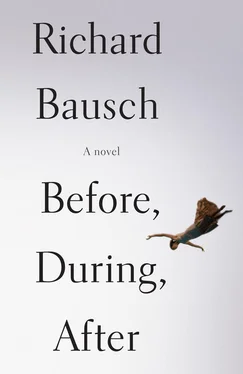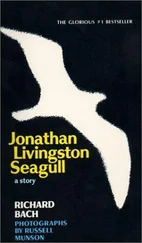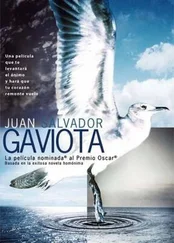Adams sat forward, and when he spoke now his voice was curiously less garbled sounding, the words more slowly pronounced, though plainly it was all coming from what he’d had to drink. “I don’t really handle”—again he belched—“I’m … I’ve not been so good at be’en by myself. You know?”
“Yes,” Faulk said.
“You know?”
“I know.”
“You know .”
“Yes.”
“Since a long time, really.”
Faulk looked into the living room and saw that Iris and Natasha had gone from there.
“You know?” Adams said.
“Yes, I do know.”
“Wife’s gone five years.”
“Sorry.”
“Five years .”
Faulk was aware that sympathy was required but was unable to feel anything like it.
“B’cause it’s a man’s right ,” Adams went on.
“I see.”
“A man’s right .” He appeared to have settled some conflict in his thoughts.
“Come on,” Faulk said, rising. “Let’s go for a walk.”
In the small bedroom, the women sat on the bed and listened to them struggle out the door, Adams still talking.
“Oh, Christ. No,” Natasha said to her grandmother. “Not tonight.”
“Do you want me to stay?”
“I’m going to bed.”
“Don’t be too discouraged. They’re entitled — it’s been awful for them, I’m sure.”
“Poor babies.”
“Hey.”
“Well?”
“Give ’em a break, honey. Come on.”
Natasha patted her grandmother’s thick-boned wrists.
“You must be exhausted,” Iris said to her. “Can I tuck you in?”
“I have to take a shower.”
She looked down. “Of course. Well.”
“I won’t take long.”
She smiled.
In the shower, Natasha got the water as hot as it would go and stood there. For a while she didn’t even use the soap. She thought of being a mother, and of the child she was carrying, imagining a little girl. Someone to grow up and live in the world. She saw again the burning towers. She saw the starry quiet sky in Jamaica, and the pictures of suffering and sorrow and confusion, and she made a forlorn, hopeless effort to shut it all, all thought, away. Finally she turned the water off and dried herself and went out to the bedroom where Iris, hearing her come, had stood and with one hand pulled the blankets back. Quickly Natasha got into her nightgown and crawled into the bed, and Iris pulled the blanket up over her shoulder, then leaned down and kissed her cheek. Iris smelled of the wine and of her perfume. Her hair was strawlike, but somehow soft, too.
“My sweet girl,” the old woman said. “I’m so proud of you.”
“Sorry about today,” Natasha said.
“Today was lovely.”
“I was short with you.”
“Stop it.”
“What do you think they’ll do?”
“They might end up in jail if they make enough noise.”
“They wouldn’t — they wouldn’t get into his car … Mr. Adams’s car.”
“I don’t think they’ll go that far. But I’ll go see. You rest. You want the light out?”
“No. I’ll read.”
“Good night.” Iris kissed her again, then made her way out on the cane.
Alone, Natasha rolled to her side in the bed and closed her eyes, feeling suddenly almost groggy. She remembered that she was pregnant. She sat up, arranging herself in the bed with pillows behind her back, and opened a book to read, a biography of Mary Todd Lincoln. But she kept reading the same sentence, over and over. The words would not register in her mind.
9
Adams sat down on the lawn in front of Iris’s house, out of breath, claiming that he was going to be sick. It had taken them some time to get this far, struggling along, Adams’s arm over Faulk’s neck, and Faulk mostly having to carry him, holding on to his wrist, hauling him when he dragged his feet. The night was shrouded by low clouds, and the air had become damp. The wetness of the grass made a dark place on the seat of the older man’s white pants where he sat. “Neveh drink like this,” he got out.
“Oh,” Faulk, who was standing over him, said. “I do.” He laughed and looked up at the bulges of darker shapes in the low heavy clouds. He wondered why some men slurred so when they got drunk, as if the alcohol went to their tongues. He himself was proud that the times when he had gone over the line had not been so obvious to people; he could always carry it. “Gonna rain,” he said to Adams.
Adams was silent.
“How long did you say you were married?”
“Twent’ years”—he made a sweeping gesture with his other arm, the one that was not holding him up—“gone.”
“I think you told me that.”
“You’re newl’wed.”
“Yeah.”
“Lucky guy, huh. Your age.”
“You got somewhere — can I get you a cab?”
“She’s veh’ pretty. Don’t think she likes me.”
“She’s the nervous type.” Faulk was surprised to hear the words come from his lips. The fact of it had a sobering effect.
Adams lay back on the grass and put one arm over his face.
Faulk had thought that they might just walk it off, but now the other man was either asleep or passed out. And here was Iris, driving up in her Taurus that had only twelve thousand miles on it. She parked along the curb where they were and got out with her cane.
For a space the two of them just stood looking at each other, Iris over the roof of her car, and Faulk standing next to the unconscious Liam Adams.
“He can’t stay there,” Iris said.
“Thought we’d just walk it off,” said Faulk.
“Yeah. Well.” Neither of them moved.
“Is Natasha—”
“She went to bed.”
Adams spoke from the ground. “I b’lieve I’m be sick.”
“Sit up,” Faulk told him. “Sit up. You’ll choke to death, for God’s sake.”
Silence.
Iris came around the car, slowly, using the cane. She was in some discomfort. He put his hand out. “No,” she said.
Adams began to snore.
“How cold will it get tonight?” Iris asked.
“Don’t know. Cool enough right now.”
“I’ll call a cab. He can stay here until it arrives, and then I’ll wake him.”
“He’ll be all right laying here?”
“I can have a cab here in fifteen, twenty minutes. He won’t freeze to death in twenty minutes. It must be sixty-something, right?”
Faulk looked at the sky and then back at her.
“Course, getting the cabbie to let him get into his cab. That’s another story. Especially if he gets sick.”
There was a pause, where they seemed to be thinking about it.
“Ridiculous,” she said. “You know? The two of you.”
“He seemed bent on getting plowed.”
“He wasn’t alone.”
Faulk waited for her to say more.
“You better get on home. I think your wife’s waiting up to tell you something. Something important. And son—” She stopped.
“Yeah?”
“I hope you’ll be up to it.”
He started down the walk.
“You want a ride?” she called.
He halted and turned. “I’ll walk.” Then he indicated Adams lying in his stupor on the grass. “You’ve got that to deal with.”
“Good night, son. Remember.”
“Good night.” He went carefully on, concentrating. He took each step as if balanced on a ledge, but he did not sway or wobble. At the end of the street he turned and looked back and saw her still standing over Adams. She raised one hand to wave. He waved back. He thought of all the years she raised Natasha alone, grieving the loss of her daughter and son-in-law, no help. Just now, the history seemed an element of the woman’s strangeness.
And then, thinking about Iris, he felt suddenly as if the difficulty inside his own marriage was in some way connected to the history: a girl raised by a woman keeping so much of her inner life to herself.
Читать дальше












